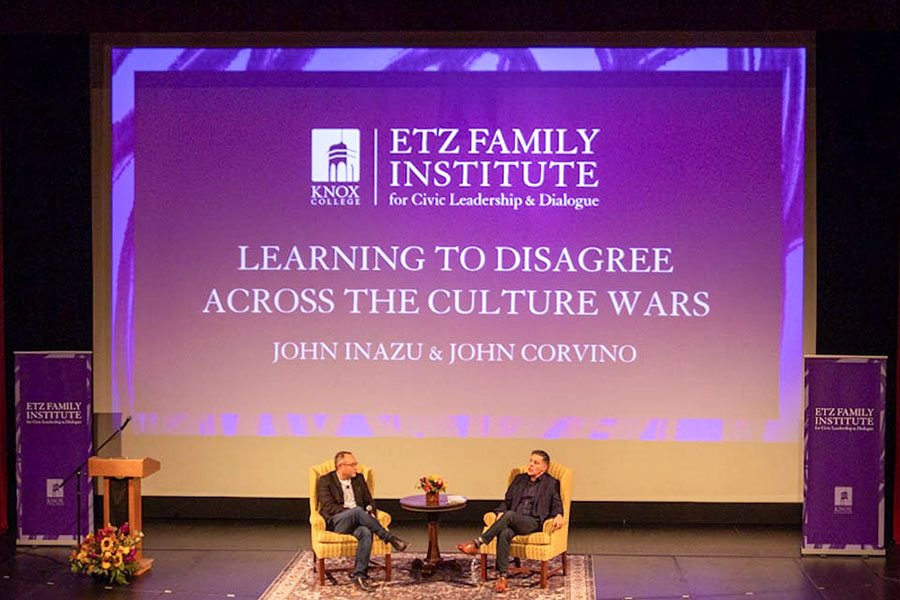Knox Stories
Knox Summer Scholars: A Summer of Research, Growth, and Community
Knox Summer Scholars gives students the chance to pursue in-depth projects with faculty mentors and motivated peers.
Venture Boldly

Office of Communications
2 East South Street
Galesburg, IL 61401


Knox College’s newly established Etz Family Institute for Civic Leadership and Dialogue marked a significant milestone with its inaugural public event, "Learning to Disagree Across the Culture Wars," on October 16 at the Orpheum Theatre in downtown Galesburg.
The event welcomed nearly 400 guests from the Knox and Galesburg communities to engage in a dialogue between two renowned experts in civil discourse: John Corvino, Dean of the Irvin D. Reid Honors College and a professor of philosophy at Wayne State University, and John Inazu, the Sally D. Danforth Distinguished Professor of Law and Religion at Washington University in St. Louis.
Providing members of the Knox community with a direct means to gain the skills and knowledge necessary to engage with people of differing viewpoints is a key goal of the Etz Family Institute. Professors Corvino and Inazu echoed this goal in their discussion, emphasizing the value of approaching conversations with humility and curiosity, warning against the growing trend of labeling opposing viewpoints as "evil" rather than simply "wrong."
They also brought their diverse perspectives through personal anecdotes about their involvement in America’s "culture wars." Corvino recounted his experiences as a gay man in the 1990s, sharing how he entered debates on sexuality and morality. Inazu discussed his work on civil liberties, particularly the right to assembly and protest, and his perspective as a Christian navigating the complexities of faith in an evolving society. Their dialogue underscored the importance of listening and understanding across ideological divides.
“Once you move from seeing your opponent as wrong to evil, it’s hard to walk back that line,” Inazu added. “If you think a person is wrong, you can still go to school with them and go downtown to eat. If you think they’re evil, none of that can really happen.”
Inazu and Corvino both shared how they handled these challenges in their own lives. Corvino noted the importance of finding common ground with those he disagrees with, while Inazu highlighted the significance of looking to history as a reminder that society has faced and overcome deep divisions before.
“Despite our imperfections, despite how much work still needs to be done, we can still point to partial progress along the way,” Inazu said.
During a closing Q&A session, audience members discussed questions of governance, social media’s influence on discourse, and the impact of protests. Both speakers remained in Galesburg the next day, visiting a class on contemporary election issues and joining the faculty for lunch to continue discussions on how their work ties into ongoing efforts at the College.
Thomas Bell, co-director of the Etz Family Institute and assistant professor of political science, expressed his enthusiasm for the crowd's engagement during the event. He hopes the dialogue will serve as a model for future discussions, offering a constructive approach to managing disagreements.
“We understand that in a diverse democracy, there are people who have differences and competing perspectives on fundamental questions of political life. This event was meant to cast a vision for what civic leadership and dialogue can look like at Knox College,” Bell added.
Watch the event on Knox College’s YouTube channel.
This inaugural event set the stage for the Etz Family Institute’s future endeavors, highlighting Knox College's commitment to fostering civic leadership and respectful discourse. Through ongoing programming, the Institute will continue to create opportunities for students and faculty to engage with differing viewpoints, collaborate, and debate solutions to pressing local and global challenges.
Published on October 30, 2024
-Mitch Prentice ’17, Office of Communications Lead Writer/Editor
 “If you think a person is wrong, you can still go to school with them and go downtown to eat. If you think they’re evil, none of that can really happen.” — Professor John Inazu
“If you think a person is wrong, you can still go to school with them and go downtown to eat. If you think they’re evil, none of that can really happen.” — Professor John Inazu